Welcome back to This Week in Apps, the weekly TechCrunch series that recaps the latest in mobile OS news, mobile applications and the overall app economy.
The app industry continues to grow, with a record number of downloads and consumer spending across both the iOS and Google Play stores combined in 2021, according to the latest year-end reports. App Annie said global spending across iOS and Google Play is up to $135 billion in 2021, and that figure will likely be higher when its annual report, including third-party app stores in China, is released next year. Consumers also downloaded 10 billion more apps this year than in 2020, reaching nearly 140 billion in new installs, it found.
Apps aren’t just a way to pass idle hours — they’re also a big business. In 2019, mobile-first companies had a combined $544 billion valuation, 6.5x higher than those without a mobile focus. In 2020, investors poured $73 billion in capital into mobile companies — a figure that was up 27% year-over-year.
This Week in Apps offers a way to keep up with this fast-moving industry in one place, with the latest from the world of apps, including news, updates, startup fundings, mergers and acquisitions, and suggestions about new apps and games to try, too.
Do you want This Week in Apps in your inbox every Saturday? Sign up here: techcrunch.com/newsletters
Top Stories
Apple’s App Privacy Report is here
Apps have been accused of quietly snooping on their users for some time. They collect data and reshare it with advertisers and other third parties, often without users’ truly informed consent. Now the tables are turned in a sense, as users will finally be able to snoop on their apps, thanks to Apple’s new App Privacy Report feature, now available in iOS 15.2 and iPadOS 15.2. This app transparency feature lets an iOS user see what their apps are actually doing — including which apps are accessing the data and the sensors on your phone, as well as where that data is being shared. The latter is revealed through the feature’s ability to report with which third-party websites an app is communicating. Some of those may be for analytics purposes, but others may be adtech sites.
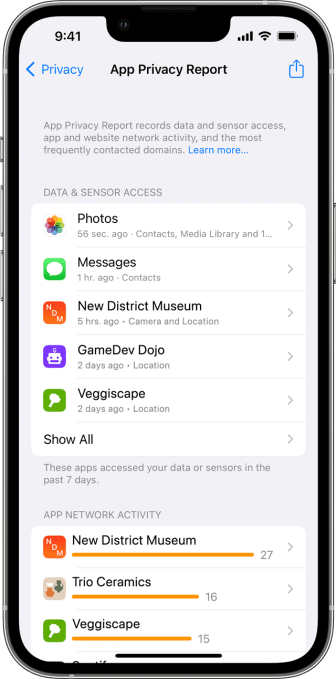
Image Credits: Apple
To use the feature, you’ll head to Settings > Privacy > App Privacy Report then switch it on. Over time, you’ll be able to see how apps accessed your data over the past seven days, complete with timestamps for its every action. While Apple should be applauded for making this information more transparent, there’s some concern that the report will leave users feeling less empowered, rather than more empowered. Sure, a favorite app may be contacting some odd-sounding domain, but what data exactly was shared? Would the user be okay with that data sharing if it were explained? If they’re not okay with it, what are they supposed to do to stop it, other than just uninstalling the app?
Apple seems to be betting on the fact that simply making this information public could push the app industry toward better behavior that’s more respectful of user privacy. But just like most users never read those long user agreements when installing software in the first place, it’s not clear to what extent this new feature will be adopted by mainstream users.
Google details Android 12 Go edition

Image Credits: Google
Google this week offered more details about the new features and updates that will be available when the first devices running Android 12 (Go Edition) are launched in 2022. Designed for low-end smartphones, apps on Go Edition will launch up to 30% faster and with smoother animation, Google says — that means they’ll open instantly, instead of presenting users with a blank screen. The new SplashScreen API will help Android developers provide this consistently smooth experience when their users launch their apps.
The updated OS will also automatically save battery life and storage by hibernating apps that haven’t been used for extended periods of time. The Files Go app, meanwhile, allows users to recover files within 30 days so users can safely delete files when they need to free up space.
Other new features include guest profiles on the lock screen; offline sharing with nearby devices via Nearby Share; a privacy dashboard that shows app activity, permissions and access to sensors; a privacy indicator that alerts you when apps are using your mic or camera; the ability to select approximate location instead of precise location when sharing your information with apps; plus the ability to listen to the news, and translate on-screen content into your language from the screen where you find your recent apps.
Some of the new features were brought over from the main Android 12 OS to Go Edition, while others were designed for the needs of low-end smartphone users — a large market. Google says more than 200 million people actively use an Android (Go Edition) phone.
Weekly News
Platforms: Apple
- Apple publicly released iOS 15.2, the second major update to its iOS 15 operating system first released in September. The new software includes many of the features that were delayed from shipping in the original release, including the new App Privacy Report which lets users know which apps are accessing their private information, like their photos, location, contacts, microphone and camera over the past seven days. It also includes an Emergency SOS update, the Apple Music Voice Plan, support for Legacy Contacts who can access your Apple ID when you die, Hide My Email, Communication Safety for Messages and more.
- Apple is investigating an issue with the latest Xcode release, which is impacting developers using Swift packages as standalone or dependencies, who may see failures during package resolution.
Platforms: Google

Image Credits: Google
- Google launched Jetpack Glance Alpha for app widgets. The new framework, built on top of the Jetpack Compose runtime, is designed to make it easier and faster to build app widgets for the Android homescreen and other surfaces.
- Google rolled out the Pixel 6 update with fixes for the camera and fingerprint sensors.
- Google announced “Notes from Google Play,” a new series where Google will share key insights and best practices to inspire app developers, by focusing on developers and their creativity. The first edition highlights developer Mohammed Kamara, whose customized healthcare app is trying to create a better world for women of color.
Augmented Reality
- Google was spotted hiring for someone to work on an “Augmented Reality OS” for an “innovative AR device.” (Google Glass is coming back? Wonder if it runs apps?)
Fintech/Crypto
- Cash App and Robinhood rolled out new crypto gifting features just ahead of the holidays. Cash App will also let users gift stock.
Social
Image Credits: Bryce Durbin/TechCrunch
- Despite its troubles, Instagram has now surpassed 2 billion MAUs worldwide, according to a report by CNBC citing unnamed Meta employees as sources. The news (which smells a bit like a planned leak if we’re being honest) paints a picture of a company unaffected by the recent congressional scrutiny and whistleblowing. It’s like a quiet nod to Wall Street that while, “sure, there are some bad things being said here, we’re still doing okay!” Instagram passed the 1 billion user mark in June 2018 after eight years, but only took three years to hit 2 billion users, the report also noted. That’s growth that’s hard to ignore. It’s also notable given TikTok’s quick rise to the top of the charts, as it’s an indication that users aren’t necessarily abandoning one app for the other — Instagram is still retaining users and growing.
- Twitter adds an auto-captions feature to make videos more accessible on its platform. Captions have also become a popular way to watch videos without sound, and are common to TikTok-like feeds — such as the one Twitter is now testing.
- Rotten Tomatoes is the latest company to partner with TikTok on TikTok Jump, the third-party integration feature that allows creators to link out to other services — in this case, movie and TV trailers, reviews and other information. Previous TikTok Jump partners include Quizlet, Wikipedia, BuzzFeed and Jumprope.
- Microsoft-owned career networking site LinkedIn launched a new app in China just months after sunsetting the local version of LinkedIn in the region. The new app, InCareer, is aimed at helping Chinese mainland professionals find jobs and companies locate great talent in China.
- TikTok said it’s going to change its algorithm to make sure people aren’t overconsuming harmful content — like things that could lead to eating disorders or depression. The changes come about after social companies, TikTok included, have been hauled in front of lawmakers to defend their apps’ track record on user safety.
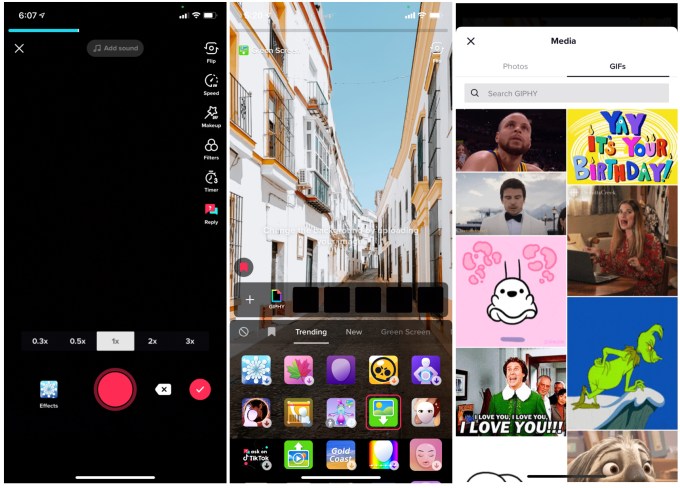
Image Credits: TikTok
- TikTok also rolled out new creative tools, including an updated Green Screen effect with support for GIFs from GIPHY; support for HD videos; new musical and animal effects, like a cat or flute, among others; and a “Visual Enhancement” button to make videos look better. The company also launched its own Discord server.
- Instagram is testing 60-second videos in Stories. The company already expanded Reels from 30 to 60 seconds earlier this summer. The company told TechCrunch it’s just a small test for the time being.
- Snap said it’s paid out $250+ million to over 12,000 creators on its TikTok rival, Snapchat Spotlight, over the course of 2021. The company noted also that 65% of Spotlight submissions used a Snapchat creative tool like an augmented reality lens, including the popular Cartoon Style 3D Lens, which hit 2.8 billion impressions in its first week after going viral.
- Pinterest and Instagram have now both rolled out the option to reply to comments using videos. Pinterest’s feature specifically allows users to reply with an “Idea Pin,” its video pin features aimed at creators. Instagram’s feature, however, is for its TikTok clone Reels.
Photo/Video
- Snap launched a new app called Story Studio, which helps creators making professional content — like videos for Spotlight. The app lets creators add text, popular music and AR effects to their videos. The app is available on iOS for users in the U.S., Canada and U.K. for the time being.
Messaging
- Messenger partnered with Ellen Degeneres to bring her mobile game Heads Up! to both Messenger and Instagram through the company’s AR video calling experience, Group Effects. Via AR, users will be able to play Heads Up! over their calls, starting with four card packs: Animals Gone Wild, That’s So 90s, Pantry Raid and Act Your Face Off.
Streaming & Entertainment
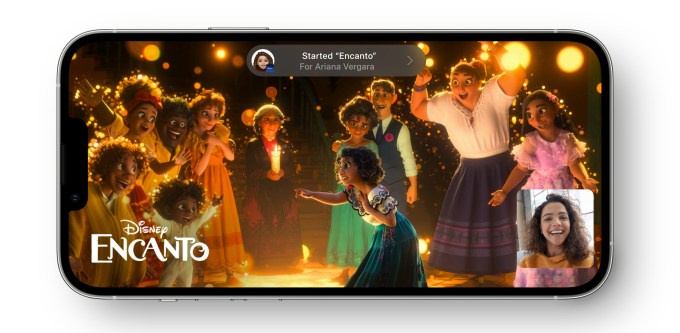
Image Credits: Disney
- Disney+ launched support for Apple’s SharePlay in an app update for iOS, iPadOS and tvOS this week. The feature will allow users to co-watch Disney+ content with friends and family over FaceTime. Up to 32 people can watch at the same time.
- Spotify is adding Apple-like podcast ratings to its app. The new system will allow users to rate podcasts on a 5-star scale, but won’t yet support written reviews.
- Apple launched its Siri-only Voice Plan for Apple Music, which directs users how to speak their requests for music to Siri instead of using the Apple Music app. (However, the app offers a simplified interface showing them recent requests and a few other things.) The plan is a cheaper $4.99 per month and is designed mainly for HomePod and AirPods users, though it works across Apple devices.
Gaming
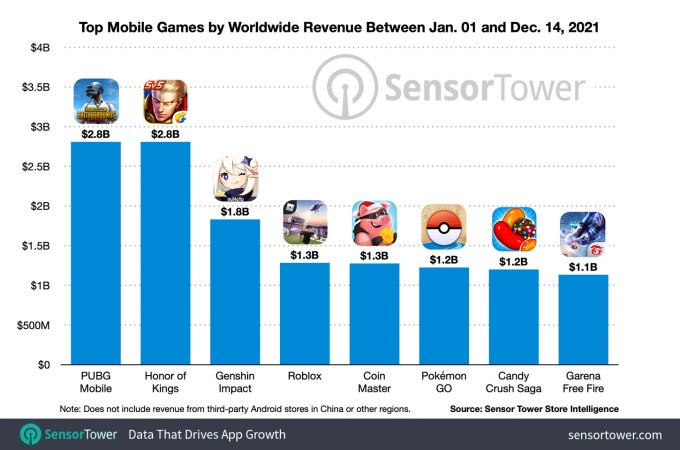
- A record-breaking eight mobile games surpassed $1 billion in player spending in 2021, Sensor Tower reports. The games included PUBG Mobile and Honor of Kings from Tencent, Genshin Impact from miHoYo, plus Roblox, Coin Master, Pokémon GO, Candy Crush Saga and Garena Free Fire. Last year, five games hit the $1 billion figure.
- Brazilian gaming company Wildlife Studios, valued at $3 billion, is facing allegations of gender discrimination and unequal pay, according to a 2020 report.
Government & Policy
- U.K. antitrust regulators said they’ve “provisionally” found in a market study that Apple and Google have been able to leverage their market power for years to create “largely self-contained ecosystems.” The findings indicate the U.K. will likely take antitrust action against the tech giants.
- Poland opened an investigation into Apple’s App Tracking Transparency feature. Poland’s Office of Competition and Consumer Protection is working to determine if Apple is trying to eliminate competitors in the personalized ads market in order to promote Apple’s own Apple Search Ads business, “in violation of competition principles.”
- Grindr was fined ~$7.1 million (65 million NOK) by Norway’s data protection authority for passing its user data to advertisers without consent — including private info related to users’ sexual orientation. The fine may serve as a warning to the adtech industry that there will be consequences to tracking users without consent.
Security & Privacy
- Apple released a new app for Android users called “Tracker Detect,” which allows Android device owners to scan for unknown AirTags nearby. The app will identify trackers that are separated from their owner and are compatible with Apple’s “Find My” network, which also includes the Chipolo ONE Spot tracker.
- Apple pulled references to its CSAM detection tech from its website after privacy fears. The tech was meant to automate the detection and reporting of child sexual abuse material (CSAM) to law enforcement. But privacy experts were concerned the system could be abused by authoritative governments who used the system to implicate innocent people for other things besides CSAM. Apple had already said it would delay the system’s rollout in order to collect further input. Whether the removed from the web means the feature is being dropped entirely, however, is unclear.
Funding and M&A (and IPOs)
 Beauty-focused livestreaming and shopping app Supergreat raised $20 million in a round led by Greenoaks and joined by Shopify and existing investors, including Benchmark, Thrive Capital, TQ Ventures, Shrug Capital and Third Kind. This is Shopify’s first investment in the creator economy, and follows a beta test where Supergreat offered one-click integration with businesses on Shopify.
Beauty-focused livestreaming and shopping app Supergreat raised $20 million in a round led by Greenoaks and joined by Shopify and existing investors, including Benchmark, Thrive Capital, TQ Ventures, Shrug Capital and Third Kind. This is Shopify’s first investment in the creator economy, and follows a beta test where Supergreat offered one-click integration with businesses on Shopify.
 Reddit filed to go public. The company confidentially filed paperwork for an eventual public offering, but didn’t disclose the total number of shares to be offered or valuation. In August, the company raised $410 million led by Fidelity, valuing it at $10 billion. It had plans to close out the round, a Series F, at $700 million at the time.
Reddit filed to go public. The company confidentially filed paperwork for an eventual public offering, but didn’t disclose the total number of shares to be offered or valuation. In August, the company raised $410 million led by Fidelity, valuing it at $10 billion. It had plans to close out the round, a Series F, at $700 million at the time.
 Private social networking app Honeycomb, aimed at families, raised $4 million in seed funding led by Peter Boyce at Stellation Capital (the new firm’s first investment). The app lets families privately share photos, videos, voice and text to tell their stories.
Private social networking app Honeycomb, aimed at families, raised $4 million in seed funding led by Peter Boyce at Stellation Capital (the new firm’s first investment). The app lets families privately share photos, videos, voice and text to tell their stories.
 Indian social networking app ShareChat raised $266 million in new funding from U.S.-based Alkeon Capital and existing investors, driving its valuation to $3.7 billion, up from $3 billion in July. This is ShareChat’s third funding round this year. Other investors include Singapore’s Temasek Holdings and Moore Strategic Ventures.
Indian social networking app ShareChat raised $266 million in new funding from U.S.-based Alkeon Capital and existing investors, driving its valuation to $3.7 billion, up from $3 billion in July. This is ShareChat’s third funding round this year. Other investors include Singapore’s Temasek Holdings and Moore Strategic Ventures.
 Social media app for investors Stocktwits raised $30 million in a round led by Alameda Research Ventures. The raise follows a year of meme stock craziness that pushed the app’s user base up by 50% to reach 6 million; 1 million of those people are active on a monthly basis. The company is now valued at $210 million.
Social media app for investors Stocktwits raised $30 million in a round led by Alameda Research Ventures. The raise follows a year of meme stock craziness that pushed the app’s user base up by 50% to reach 6 million; 1 million of those people are active on a monthly basis. The company is now valued at $210 million.
 Weight care management app Found raised $100 million in Series B funding, valuing the company at $600 million. WestCap, a growth equity firm founded by former Blackstone and Airbnb executive Laurence Tosi, led the round. Other investors included IVP, The Chernin Group, G9 Ventures, Able Partners, GV, Define and founding investor Atomic. The company said its annual run rate grew 6x in 2021 and has tens of thousands of members.
Weight care management app Found raised $100 million in Series B funding, valuing the company at $600 million. WestCap, a growth equity firm founded by former Blackstone and Airbnb executive Laurence Tosi, led the round. Other investors included IVP, The Chernin Group, G9 Ventures, Able Partners, GV, Define and founding investor Atomic. The company said its annual run rate grew 6x in 2021 and has tens of thousands of members.
 E-commerce marketplace The List raised $3.5 million in seed funding from American Designer, Rachel Zoe and others. The company also launched its app offering access to luxury brands and retailers through a personalized shopping experience that includes livestreams.
E-commerce marketplace The List raised $3.5 million in seed funding from American Designer, Rachel Zoe and others. The company also launched its app offering access to luxury brands and retailers through a personalized shopping experience that includes livestreams.
 Subscription data platform for apps Qonversion raised $2 million in seed funding led by Visionaries Club and Flashpoint Venture Capital. The company will use the funds to set up its HQ in London and expand teams across the U.S., Europe and APAC. The company has 1,000 customers.
Subscription data platform for apps Qonversion raised $2 million in seed funding led by Visionaries Club and Flashpoint Venture Capital. The company will use the funds to set up its HQ in London and expand teams across the U.S., Europe and APAC. The company has 1,000 customers.
 Game streaming site and app Medal.tv, which lets creators clip and share gaming moments, raised $60 million in funding as it reached 2 million clips shared per day. The funding includes a $45 million round led by Omers Ventuers, then a $15 million round from Makers Fund, Horizon Ventures, Dune Ventures and others.
Game streaming site and app Medal.tv, which lets creators clip and share gaming moments, raised $60 million in funding as it reached 2 million clips shared per day. The funding includes a $45 million round led by Omers Ventuers, then a $15 million round from Makers Fund, Horizon Ventures, Dune Ventures and others.
 U.K.-based social audio app Wisdom raised ~$2 million in a seed round led by First Round Capital. The app, which launched in October, connects people looking for mentorship and advice.
U.K.-based social audio app Wisdom raised ~$2 million in a seed round led by First Round Capital. The app, which launched in October, connects people looking for mentorship and advice.
 LA-based Papaya raised $50 million in Series B funding to give people a new way to pay bills by snapping a photo of their bill then submitting their payment through the app. The round was led by Bessemer Venture Partners, and brings the company’s total raise to $65 million since its 2016 founding.
LA-based Papaya raised $50 million in Series B funding to give people a new way to pay bills by snapping a photo of their bill then submitting their payment through the app. The round was led by Bessemer Venture Partners, and brings the company’s total raise to $65 million since its 2016 founding.
 Tagg, a “social branding app” for Gen Z, raised $2 million in seed funding from Twitter co-founder Biz Stone, Facebook’s former VP of International Growth Ed Baker, TripAdvisor founder Stephen Kaufer, Pillar VC and others. The app allows young creatives to connect, collaborate and develop friendships.
Tagg, a “social branding app” for Gen Z, raised $2 million in seed funding from Twitter co-founder Biz Stone, Facebook’s former VP of International Growth Ed Baker, TripAdvisor founder Stephen Kaufer, Pillar VC and others. The app allows young creatives to connect, collaborate and develop friendships.
 London-based HungryPanda, a Mandarin-language food and grocery delivery app for overseas Chinese users, raised $130 million in series D funding led by Perwyn, bringing its total raise to $220 million. The funds will help the app expand to more markets.
London-based HungryPanda, a Mandarin-language food and grocery delivery app for overseas Chinese users, raised $130 million in series D funding led by Perwyn, bringing its total raise to $220 million. The funds will help the app expand to more markets.
 CreditBook, a bookkeeping app for small merchants, raised $11 million in pre-Series A funding led by Tiger Global. This is Tiger Global’s first investment in a Pakistan-based startup.
CreditBook, a bookkeeping app for small merchants, raised $11 million in pre-Series A funding led by Tiger Global. This is Tiger Global’s first investment in a Pakistan-based startup.
 Spotify acquired the podcast tech company Whooshkaa, which turns radio broadcasts into on-demand audio. The company plans to integrate this technology into Megaphone, as Spotify already offers the other tools Whooshkaa had provided like hosting, distribution and ads.
Spotify acquired the podcast tech company Whooshkaa, which turns radio broadcasts into on-demand audio. The company plans to integrate this technology into Megaphone, as Spotify already offers the other tools Whooshkaa had provided like hosting, distribution and ads.
Downloads
Pixelmator photo
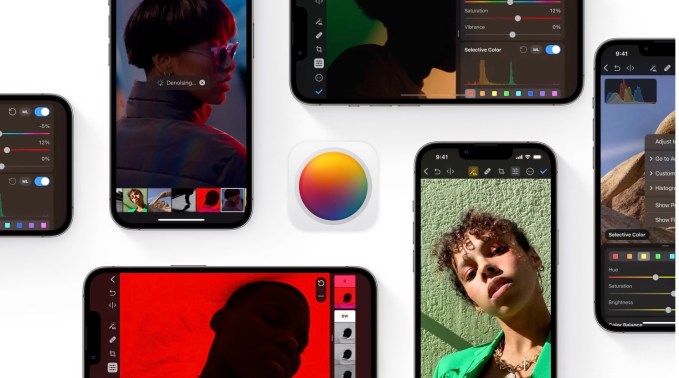
Image Credits: Pixelmator
The popular photo-editing app Pixelmator has now brought its powerful tools to the iPhone with the launch of Pixelmator Photo for iPhone. The new app offers users over 30 “desktop-class” color adjustment tools, based on those first developed for Pixelmator Pro for the Mac. It also supports over 600 RAW formats, including Apple’s new ProRAW format. Other tools leverage machine learning capabilities, like an automatic photo enhancement tool that, with a tap, lets you improve a photo to make it look more professional. You can also enhance photos with AI, remove camera noise, automatically crop photos and more. The new app is a universal app for both iPad and iPhone. If you already owned the iPad version, then you will get the iPhone version automatically. At launch, it’s 50% off at $3.99.
Swift Playgrounds 4
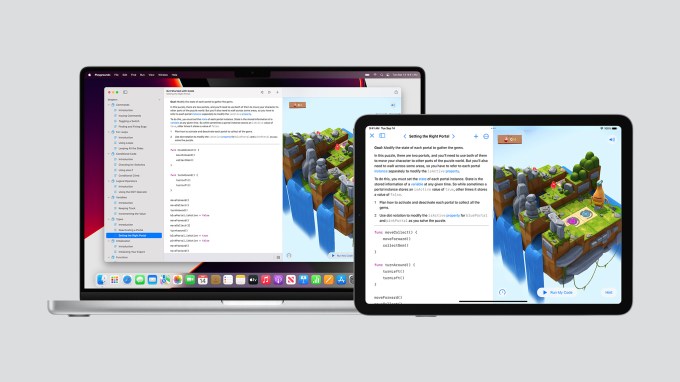
Image Credits: Apple
Apple this week released the latest version of its Swift Playgrounds app, which now lets users build iPhone and iPad apps with SwiftUI right on their iPad. This feature requires iPadOS 15.2 or later. As you make updates to your app, an App Preview feature lets you see the changes as they’re applied and a full-screen preview lets you view your app edge-to-edge. When you’re finished, built in App Store Connect integration lets you upload your finished app to the App Store. The app also includes inline code suggestions, tools to move projects from Xcode and back, project-wide search results, a Snippets Library with hundreds of SwiftUI controls, symbols and colors, and more. A new open project format based on Swift packages can also be opened and edited in Swift Playgrounds for iPad, as well as within Xcode on Mac, Apple noted.
Adobe’s Creative Cloud Express
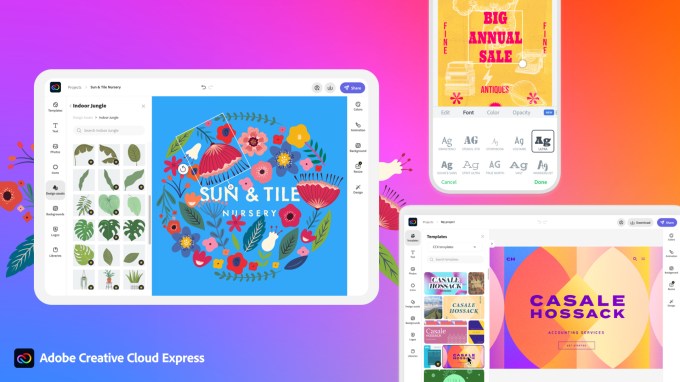
Image Credits: Adobe
Adobe this week launched a new web and mobile app — and Canva rival — called Creative Cloud Express that combines features from its Creative Cloud Suite and Acrobat PDF tools into a single application. The app, which replaces Adobe Spark, aims to help users quickly create anything — like social media posts, posters, videos and more using templates, stock images and other assets. The app will offer a free tier and a $9.99 per month version with additional capabilities and an expanded library of more complex templates. Free users can access 1 million images and other assets, while premium users get access to 175 million Adobe Stock photos, 20,000 fonts and access to Photoshop Express and Premiere Rush.

